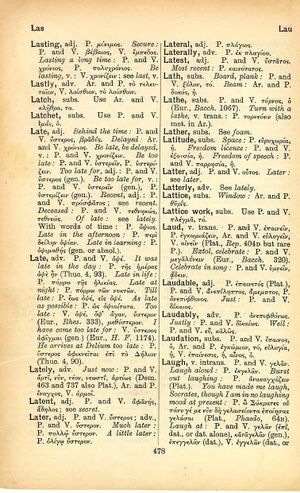laugh: Difference between revisions
Φίλος με βλάπτων (λυπῶν) οὐδὲν ἐχθροῦ διαφέρει → Laedens amicus distat inimico nihil → Ein Freund, der schadet, ist ganz gelich mir einem Feind
mNo edit summary |
m (Woodhouse1 replacement) |
||
| Line 1: | Line 1: | ||
{{Woodhouse1 | {{Woodhouse1 | ||
|Text=[[File:woodhouse_478.jpg|thumb|link={{filepath:woodhouse_478.jpg}}]] | |Text=[[File:woodhouse_478.jpg|thumb|link={{filepath:woodhouse_478.jpg}}]] | ||
===verb intransitive=== | |||
P. and V. γελᾶν. | [[prose|P.]] and [[verse|V.]] [[γελᾶν]]. | ||
[[laugh aloud]]: P. ἐκγελᾶν. | [[laugh aloud]]: [[prose|P.]] [[ἐκγελᾶν]]. | ||
[[burst out laughing]]: P. ἀνακαγχάζειν ( | [[burst out laughing]]: [[prose|P.]] [[ἀνακαγχάζειν]] ([[Plato]]). | ||
[[you have made me laugh, Socrates, though I am in no laughing mood at present]]: P. ὦ Σώκρατες οὐ | [[you have made me laugh, Socrates, though I am in no laughing mood at present]]: [[prose|P.]] [[ὦ Σώκρατες οὐ πάνυ γέ με νῦν δὴ γελασείοντα ἐποίησας γελάσαι]] ([[Plato]], ''[[Phaedo]]'', 64B). | ||
[[laugh at]]: P. and V. γελᾶν (ἐπί, dat., or dat. alone), καταγελᾶν (gen.), ἐπεγγελᾶν (dat.), V. ἐγγελᾶν (dat., or κατά, gen.), διαγελᾶν (acc.). | [[laugh at]]: [[prose|P.]] and [[verse|V.]] [[γελᾶν]]; (ἐπί, dat., or dat. alone), [[καταγελᾶν]] (gen.), [[ἐπεγγελᾶν]] (dat.), [[verse|V.]] [[ἐγγελᾶν]]; (dat., or κατά, gen.), [[διαγελᾶν]] (acc.). | ||
[[mock]]: P. and V. σκώπτειν (acc.) (Eur., '' | [[mock]]: [[prose|P.]] and [[verse|V.]] [[σκώπτειν]]; (acc.) ([[Euripides|Eur.]], ''[[Cyclops]]'' 675 absol.), [[Aristophanes|Ar.]] and [[prose|P.]] [[χλευάζειν]] (acc.), [[ἐπισκώπτειν]] (acc.), [[verse|V.]] [[κερτομεῖν]]; (acc.); see [[mock]]. | ||
[[simplicity was laughed down and disappeared]]: P. τὸ | [[simplicity was laughed down and disappeared]]: [[prose|P.]] [[τὸ εὔηθες… καταγελασθὲν ἠφανίσθη]] ([[Thucydides|Thuc.]] 3, 83). | ||
[[without laughing]]: use adv., [[prose|P.]] [[ἀγελαστί]]. | |||
}} | }} | ||
Revision as of 09:15, 20 May 2020
English > Greek (Woodhouse)
verb intransitive
burst out laughing: P. ἀνακαγχάζειν (Plato).
you have made me laugh, Socrates, though I am in no laughing mood at present: P. ὦ Σώκρατες οὐ πάνυ γέ με νῦν δὴ γελασείοντα ἐποίησας γελάσαι (Plato, Phaedo, 64B).
laugh at: P. and V. γελᾶν; (ἐπί, dat., or dat. alone), καταγελᾶν (gen.), ἐπεγγελᾶν (dat.), V. ἐγγελᾶν; (dat., or κατά, gen.), διαγελᾶν (acc.).
mock: P. and V. σκώπτειν; (acc.) (Eur., Cyclops 675 absol.), Ar. and P. χλευάζειν (acc.), ἐπισκώπτειν (acc.), V. κερτομεῖν; (acc.); see mock.
simplicity was laughed down and disappeared: P. τὸ εὔηθες… καταγελασθὲν ἠφανίσθη (Thuc. 3, 83).
without laughing: use adv., P. ἀγελαστί.

